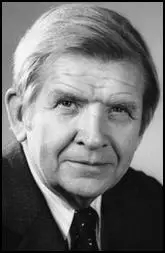Terry Sanford

Terry Sanford was born in Laurinburg, North Carolina, on 20th August, 1917. He was educated at the Presbyterian Junior College and the University of North Carolina. In 1941 he joined the Federal Bureau of Investigation.
During the Second World War he served in the United States Army (1942-1945) where he served in Italy, France, and Germany. A member of the parachute regiment, Sanford participated in D-Day and the Battle of the Bulge.
In 1946 Sanford was appointed assistant director of the Institute of Government at Chapel Hill. Two years later he began practicing law in Fayetteville.
A member of the Democratic Party, Sanford elected President of the North Carolina Young Democratic Clubs. He also served as a member of the North Carolina State Senate (1953-54). In 1960 Sanford attended the Democratic National Convention where he played an important role in helping John F. Kennedy obtain the nomination. Sanford was the first of the southern leaders attending the convention to leave the camp of Lyndon B. Johnson.
Sanford was elected as Governor of North Carolina in 1961. According to Kennedy's secretary, Evelyn Lincoln, he was considering making him his running mate in 1964.
In November 1987 Sanford was elected to the Senate. He served as chairman of the Select Committee on Ethics until losing his seat in 1993. He returned to work as a lawyer in Washington.
Terry Sanford died in Durham, North Carolina on 18th April, 1998.
Primary Sources
(1) John F. Kennedy, speech (17th September, 1960)
I have discussed the problem of our rural areas with your next Governor - Terry Sanford. I like his approach. We see eye to eye on his "positive program" for better research, for better roads, for better cooperation between farmer and businessman and Government to bring the processing plants and other light industries into rural areas for balanced growth. I am going to look to Terry Sanford for further advice in working out a sound program for Federal-State cooperation to reverse the disgraceful neglect of our rural population under eight years of Ezra Taft Benson.
(2) Evelyn Lincoln, Kennedy and Johnson (1968)
As Mr. Kennedy sat in the rocker in my office, his head resting on its back he placed his left leg across his right knee. He rocked slightly as he talked. In a slow pensive voice he said to me, 'You know if I am re-elected in sixty-four, I am going to spend more and more time toward making government service an honorable career. I would like to tailor the executive and legislative branches of government so that they can keep up with the tremendous strides and progress being made in other fields.' 'I am going to advocate changing some of the outmoded rules and regulations in the Congress, such as the seniority rule. To do this I will need as a running mate in sixty-four a man who believes as I do.' Mrs. Lincoln went on to write "I was fascinated by this conversation and wrote it down verbatim in my diary. Now I asked, 'Who is your choice as a running-mate?' 'He looked straight ahead, and without hesitating he replied, 'at this time I am thinking about Governor Terry Sanford of North Carolina. But it will not be Lyndon.'"

